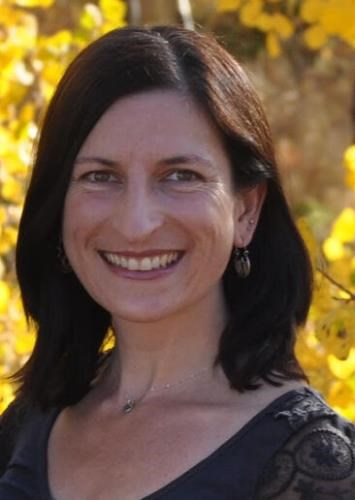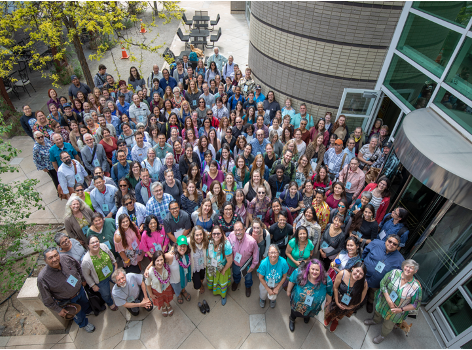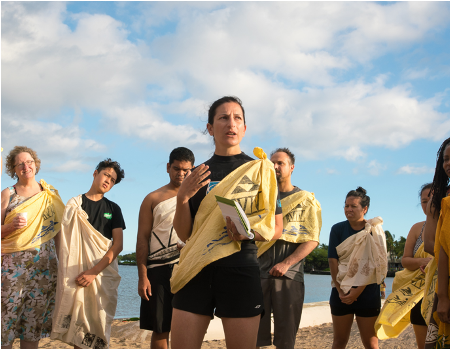Highlighting Key Sessions at AMS 2025
How can the scientific enterprise be improved by including Indigenous knowledge systems and scientific methodologies? How can we better support Indigenous researchers? How can other researchers cultivate respectful and fruitful relationships with Indigenous communities to improve the actionable, cultural and societal relevance of scientific efforts and environmental adaptation?
Since 2010, sessions and symposia at the AMS Annual Meeting have highlighted the importance of recognizing and respecting Indigenous science and knowledge systems within our geoscience communities. Dr. Heather Lazrus, co-founder of the Rising Voices Center for Indigenous and Earth Sciences, was a key force behind these initiatives. To honor Lazrus, who passed on from cancer in February 2023, the 105th Annual Meeting will host the AMS 2025 Heather Lazrus Symposium, “Convergence Science: Indigenous Weather, Water and Climate Knowledge, Systems, Practices and Communities.”

“The urgent threat posed by our climate crisis necessitates innovative actions. Innovation is an opportunity to look beyond Earth sciences to solutions in other knowledge systems and, in doing so, to support the rising voices of those who have been historically marginalized.”
– Lazrus et al., 2022
What is Convergence Science?
As Symposium co-host Julie Maldonado and colleagues write in an upcoming paper, convergence science “brings together diverse disciplines, cultures, knowledge systems, and ways of knowing and understanding to solve complex problems that cannot be addressed by a single discipline or knowledge-system alone.” The term “convergence science” is often used in the context of bringing together physical, biological, and social sciences; recognizing Indigenous perspectives further emphasizes the artificial nature of boundaries between sciences and ways of knowing. The Rising Voices, Changing Coasts Hub notes that convergence science asserts “the deep relationality of life, of the planet, of mother earth, of the affirmation that we are all related.”
Honoring a Life of Justice and Leadership

Lazrus, a noted environmental anthropologist, made important strides to strengthen collaborations among Indigenous communities and researchers around climate and environmental change. She co-founded and co-directed the Rising Voices Center for Indigenous and Earth Sciences at the U.S. National Science Foundation’s National Center for Atmospheric Research and was co-principal investigator of the NSF-funded Rising Voices, Changing Coasts: The National Indigenous and Earth Sciences Convergence Hub (RVCC Hub) project.
(Image: Attendees at the 7th Annual Rising Voices Workshop, held in 2019 at NSF NCAR in Boulder, CO. Photo courtesy of the Rising Voices Center.)
Lazrus was a beloved kin in many communities, who navigated complex discussions and relationships with skill to foster respectful and meaningful relationships. Author of more than 100 research articles, book chapters, influential reports, and more, Lazrus was one of the most cited experts in her field. Yet she was also known for her humility and willingness to engage in important work behind the scenes.

As her colleagues Julie Maldonado, Elizabeth Marino, Shannon McNeeley, and Courtney Carothers wrote in their tribute to her for the Society for Applied Anthropology, “Heather … was a mother, partner, friend, scholar, adventurer, social justice advocate, scientist, matchmaker, and intellectual, involved in the creation of many relationships, ideas, and movements …”
“She was a trailblazer among scientists centering culture and equity in the study of the lived experiences of climate change. She was also an early advocate for decolonized pedagogy and research.”
(Image: Lazrus at the 4th Annual Rising Voices Workshop, held in 2016 on Hawai‘i Island. Photo courtesy of the Rising Voices Center.)
“She fought always for what is right. She was funny. She led with her heart. She believed that the world could become a better place. … We believe she is still close to the work she leaves behind, and close to the circle of people and all relations that will carry her legacy forward.”
What to Expect from the Symposium
The Lazrus Symposium will host a Presidential Session with the RVCC’s’ Louisiana Hub, in which local Tribal leaders, elders, and partnering scientists share their stories of weaving together Indigenous and other science knowledge for place-based convergence science and community adaptation.
The Symposium will also include presentations from early career Indigenous scholars on emerging Indigenous innovations related to weather, water, and climate. For example, sharing ideas focused on Indigenous-led systems change and capacity sharing for community resilience, salt marsh restoration as climate mitigation, convergent research for climate adaptation and supporting subsistence harvests, and biocultural approaches to mitigate fire risk. A luncheon will be held in honor of Lazrus, featuring a special screening of “Everything Has a Spirit” and a conversation with filmmaker Ava Hamilton (Arapaho). In addition, the program includes discussions on how to improve scientific partnerships among federal agencies and Tribal governments and communities, and presentations by Indigenous scientists on fostering intercultural dialogue and respectful engagement.
“Whether you have long been engaged in convergence science or intercultural collaborations or you are learning about these ideas for the first time, this space is for you,” note the session organizers. “We welcome the AMS community into this ongoing conversation to co-create culturally relevant and actionable scientific knowledge and actions that increase climate resilience and support healthy, thriving communities today and for future generations.”
The Heather Lazrus Symposium will be held Monday, 13 January, 2025 at the AMS 105th Annual Meeting, in New Orleans, LA, and online; it will feature invited presentations along with a special luncheon. Learn more about the Symposium and view the program.
Special thanks to the Symposium Organizing Committee: Julie Maldonado (Livelihoods Knowledge Exchange Network); Stephanie Herring (NOAA’s National Centers for Environmental Information); Eileen Shea (Rising Voices); Diamond Tachera (NSF NCAR); Katie Jones (NEON | Battelle); Robbie Hood (Blue Thunderbird LLC); Tim Schneider (NSF NCAR Research Applications Laboratory); Jen Henderson (Texas Tech University); Carlos Martinez (NSF).